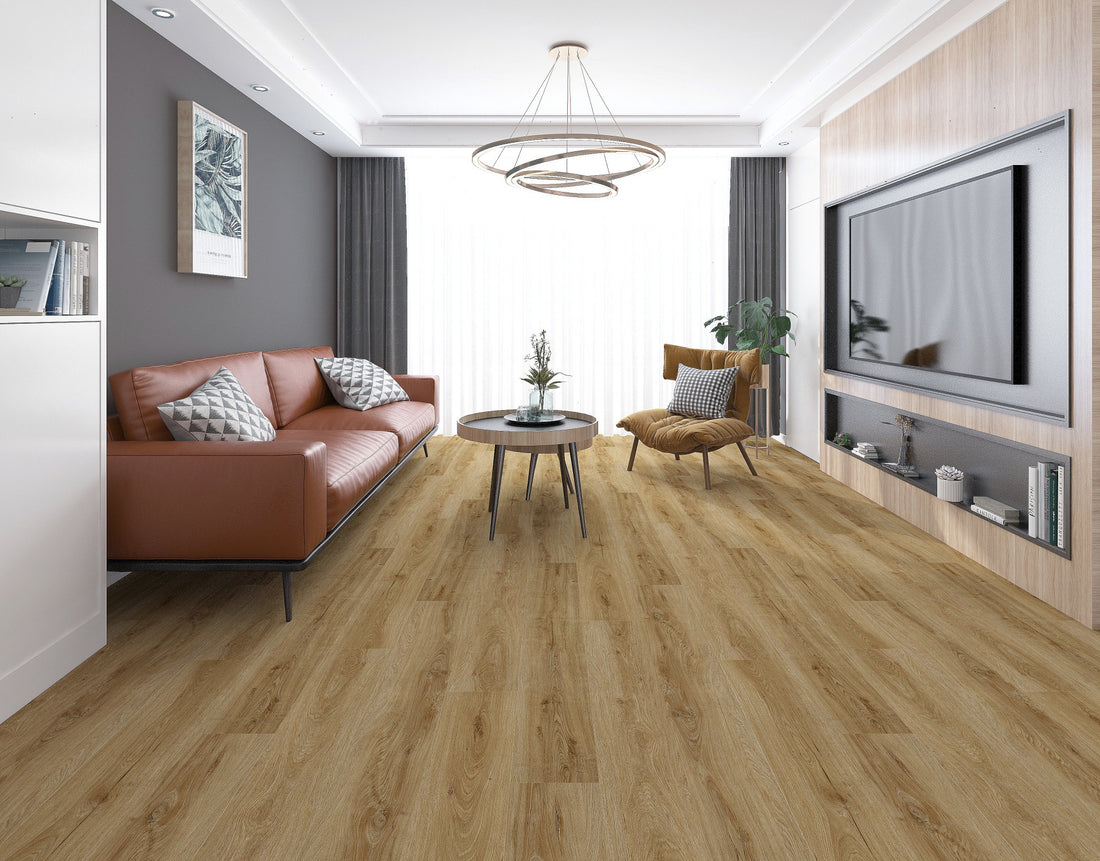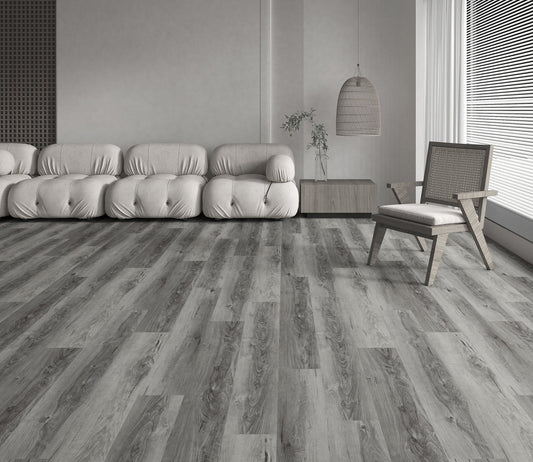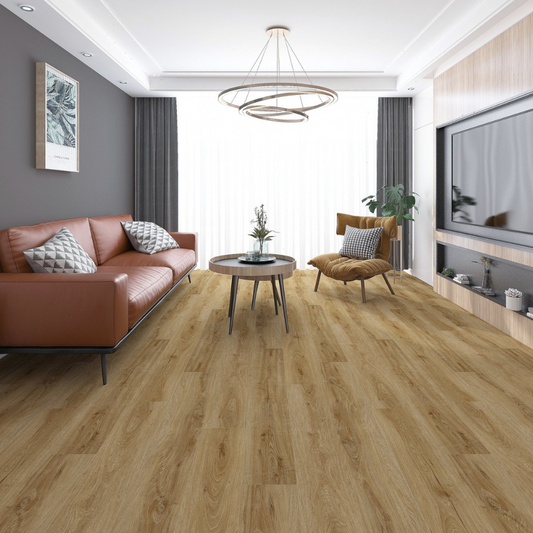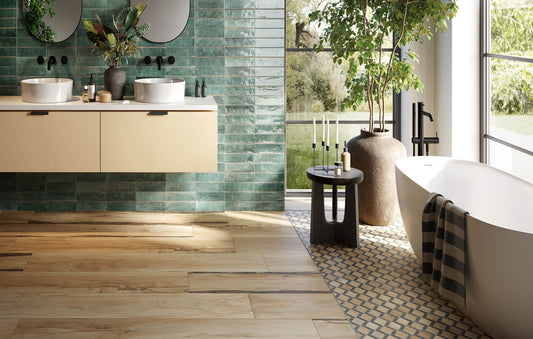9Where bathroom renovations are concerned, choosing the right flooring is paramount to finding the perfect blend of style and functionality. With a variety of options like Stone Polymer Composite (SPC), Luxury Vinyl Tile (LVT), and porcelain or ceramic tile, navigating the best choice for you can seem like a tricky task.
With this blog, we will explore these popular flooring types and focus on the key factors of water resistance, cleaning and maintenance, durability, and ease of installation. Whether looking for a modern flooring solution or a classic touch, we’ll guide you through the best flooring options for your bathroom.
What Flooring Options Are Available?
Bathroom flooring options have a few popular choices, here is a brief overview of the main ones we are looking at today.
Luxury Vinyl Tile: Manufactured with a polyvinyl chloride core (PVC), has a design layer on top and a protective outer layer to protect against wear. It is durable while remaining flexible, and offers a natural aesthetic appeal by mimicking materials like wood and stone.
Stone Polymer Composite: Engineered using a composite of PVC and limestone, the core of SPC flooring offers enhanced durability, while its composition allows for a textured design that mimics not only the look but the feel of natural materials like wood and stone.
Tile: Produced in ceramic and porcelain options, tiles are known for their tough, waterproof surface, extensive design choices, and ease of cleaning.
Water Resistance
As the designated wet room of the house, water resistance for bathrooms is paramount. Water ingress can cause damage to the underlying floor, resulting in structural problems or the proliferation of mould, so protecting against this is essential.
- Luxury Vinyl Tile: LVT flooring is highly resistant to water thanks to its PVC core and protective layers. A practical choice for wet areas, ensuring splashes and spills do not seep underneath and lead to warping or water damage.
- Tile: Ceramic and porcelain tiles have long been utilised throughout history as the choice for bathrooms, used as long ago as the Roman times in public bathhouses. Their porous make-up is sealed with a waterproof glaze, but care must be taken to ensure the grouting between tiles is sealed to prevent water ingress.
- Stone Polymer Composite: SPC combines the natural water resistance of stone with the practicality and versatility of vinyl. Highly resistant to water, SPC flooring is unable to absorb moisture, meaning it will never warp or become damaged due to the presence of water, making it perfect for bathrooms.
Cleaning and Maintenance
Ensuring spills and dirt can easily be cleaned is another key consideration when choosing your next bathroom floor. Let’s see how each option fares.
- Luxury Vinyl Tile: LVT’s hardy and water-resistant surface makes it difficult for stains to cling to. This means that cleaning is as simple as using a mop and mild cleaner to wipe away dirt, making them a convenient and hygienic choice for bathrooms. LVT’s smooth surface prevents grime and dirt from embedding which prevents bacteria and mould from accumulating making this a particularly hygienic choice.
- Tile: Tile flooring is also easy to clean and maintain. Its smooth glazed surface is resistant to stains and is compatible for use with strong cleaners without becoming damaged, making them a good choice for bathrooms with heavy use such as public restrooms.
- Stone Polymer Composite: SPC flooring is not only waterproof but also stain-resistant and simple to clean as our other two contenders. Using a mop and mild cleaner, dirt and stains can be lifted from the surface with ease and your flooring can continue to look as good as new. Its enhanced durability ensures it can handle frequent cleaning without issue and its resistance to staining keeps it looking newer for longer. SPC flooring is a good choice for busy households and commercial spaces where hygiene is a priority.
Durability
As one of the busiest rooms in the house, a new bathroom floor needs to withstand the rigours of daily wear and use and be resilient to potential impacts or accidents that may occur throughout its life.
- Luxury Vinyl Tile: LVT is less rigid than the other two options but this makes it more resilient to impacts, and less likely to chip or crack. This flexibility allows it to absorb minor impacts without damage which does make it a practical choice for families. Care must be taken however as sharp objects are still able to mark, tear and gouge the surface.
- Tile: Tiles are especially durable and can withstand heavy foot traffic and impacts, but are also liable to crack or chip under excessive force. Their robust surfaces are resistant to scratches and dents, which make them ideal choices for long-term use. The strength of porcelain and ceramic tiles has long made them the preferred choice for bathrooms but can be cold underfoot and may require underfloor heating to counteract this.
- Stone Polymer Composite: SPC flooring's rigid core makes it extremely durable thanks to the combination of stone and plastic composites. Able to handle high-traffic areas with ease, it is resistant to dents and scratches, maintaining its natural aesthetic throughout its long lifetime. The stone content of SPC flooring provides increased weight and stability which reduces the likelihood of movement or shifting. SPC flooring is a robust option that can withstand the demands of daily household use and commercial bathroom settings.
Ease of Installation
Whether considering a DIY approach or as a professional installer, understanding how simple or technical each flooring option is to install is a key consideration in choosing the right flooring for you.
- Luxury Vinyl Tile: LVT flooring often comes with a click-and-lock system which is user-friendly and suitable for DIY projects. The click-and-lock system ensures a tight fit which helps to minimise the risk of water seepage. Requiring only minimal preparation, LVT can be installed over most existing floors. An easy installation process makes this an attractive option for those looking to refresh their bathroom with minimal fuss and whilst saving on labour.
- Tile: Whilst tiles offer great durability and a range of aesthetics their installation is a complex process requiring the appropriate backer boards and professional expertise. With a process that involves preparing and installing a subfloor, adhesive application, ensuring tight waterproof seals and careful placement, it can be a tricky job for beginners to attempt. The complex and rigorous installation process is crucial to ensure a level surface and minimise potential damage and movement further down the line. This can incur a higher initial cost which needs to be weighed against tiles' long-term benefits.
- Stone Polymer Composite: Similar to LVT, SPC flooring uses a click-and-lock system for a simple yet effective installation process. SPC often comes with an attached underlay, removing the need for extra steps and preparation which further improves the ease of installation. The integrated underlay offers additional comfort underfoot and helps with sound insulation which can make stone polymer composite a practical choice for multi-story homes or apartments. The rigidity of SPC planks makes the installation process easier too, reducing the possibility of mistakes or planks being out of alignment.
Conclusion
When renovating the bathroom it can be good to consider a few key factors when choosing your next flooring option: water resistance, cleaning and maintenance, durability, and ease of installation.
LVT is known for its water-resistant nature and easy maintenance but falls short of the other options in terms of longevity and durability.
Tiles are also known for their highly water-resistant properties as well as their extreme durability, however, their installation process is complex and requires professional expertise which does raise their initial cost.
SPC flooring is highly water resistant, highly durable, and easy to install for professionals and DIYers alike. At home in both commercial and residential settings, SPC mimics natural materials such as wood and stone with ease, bringing modern innovations in materials with the timeless aesthetic of nature into one wonderful product.
Each of these options can meet a range of needs and care should be taken to consider which flooring option best suits the needs of your particular project.
For those seeking the best that SPC flooring has to offer check out Nutile’s range of SPC flooring today.




